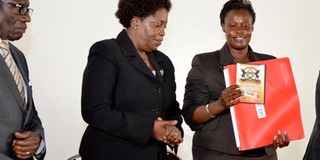60 per cent fail sciences, minister blames teachers

Minister of Education Jessica Alupo (R) displays the UCE handbook during the release of the results at UMA conference hall in Kampala yesterday as UNEB chairperson Mary Okwakol (C) and UNEB secretary Mathew Bukenya look on. PHOTO BY DOMINIC BUKENYA
Kampala. The government’s emphasis on science subjects has seen most students who sat last year’s Uganda Certificate of Education (UCE) examinations fail.
According to results released by the Uganda national Examinations Board (Uneb), 60 per cent of the 306,507 candidates, who sat 2015 exams failed to obtain at least Pass 8, to qualify for a grade.
“…despite improvement in Physics and Chemistry, the percentage pass levels remain low with almost 60 per cent of the candidates unable to demonstrate the minimum competency required to be graded,” Mr Mathew Bukenya, the Uneb executive secretary, said.
Arts subjects such as English, Christian Religious Education, Islamic Religious Education, Commerce, Fine Art with exception of History, registered good improvements while Chemistry, Physics, Agriculture, Biology, Geography, were performed poorly. Government has been encouraging students to focus more on sciences in order to acquire practical skills, which will translate into innovations and in turn create jobs.
The rule
After President Museveni said the Arts courses were “useless” in 2014, the government introduced the students loan scheme at university level to give priority to science students on top of the various curricula reviews to promote sciences. But returns on such initiatives seem to be yielding little with Education minister Jessica Alupo yesterday blaming teachers for not utilising laboratory services the government has established in schools.
“I have been informed that the student poor performance in sciences is due to teachers not teaching practicals,” Ms Alupo said although she admitted there are few science teachers in most of the schools.
Mr William Kiyala, the headteacher of Kalongo Seed Secondary School in Nakasongola District, said the school has 900 students but the government has assigned only 14 teachers of which four are science teachers. “The idea of making science subjects compulsory was good but I think, it needed a lot of planning. In colleges, you only find students going into the teaching profession as a last resort and even when they come out [of the college], they do not have the morale [to teach],” Mr Kiyala said.




